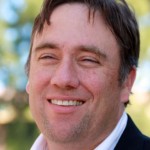Opinion: California needs to embrace the apocalypse
By Joe Mathews
Is California being governed by apocalyptic French philosophy?
Oui. But it’s not the end of the world.

Joe Mathews
Indeed, apocalyptic French philosophy may finally provide a resolution to that age-old California mystery: What is the meaning of Jerry Brown?
In recent years, our governor’s statements have taken an end-of-days turn, Jerry channeling Jeremiah, with the governor warning of nuclear holocaust, apocalyptic wildfires, the collapse of Silicon Valley if his water plans aren’t adopted, and Armageddon if we don’t reduce carbon emissions.
Where is he getting all this angst? Here’s one answer: Brown is a longtime friend of the French techno-philosopher Jean-Pierre Dupuy, who practices what is called “enlightened doomsaying” from perches at Stanford and Paris’ École Polytechnique.
Dupuy’s long-running conversations with Brown have become high profile, with Dupuy joining him at events in Paris during December’s climate change talks.
I am neither French nor a philosopher. But I’ve been reading everything Dupuy has published in English. I’m glad I did.
Dupuy’s work not only provides reassurance that there is a coherent philosophy behind our governor’s ramblings. The work itself is irresistibly thought provoking, brilliantly connecting history, science, religion, economics, and art in an open spirit. I’d recommend that all Californians—as citizens of a global hub for apocalyptic and utopian thinking—read his most accessible book, “The Mark of the Sacred”. It should be required for state workers.
Here’s a summary: We are doomed to destroy ourselves because humanity has lost touch with its sacred origins—not just faith but rituals and traditions that remind us how many things are beyond human control.
This hubris creates two problems. First, we no longer understand our own limits, and recklessly reshape the world without anticipating the consequences. Second, without a respect for the sacred, we can’t convert our knowledge about the threats we’ve created to our own existence—from nuclear weapons to climate change—into the visceral belief necessary to galvanize humanity to save itself.
“It is my profound belief that humanity is on a suicidal course, headed straight for catastrophe,” Dupuy writes.
Dupuy’s solution: “enlightened doomsaying.” We must imagine ourselves in the unthinkable future, peering into the black hole of nonexistence so that we might understand our limits and sacred origins. “To believe in fate is to prevent it from happening,” he writes.
That may sound awfully French, but he grounds his philosophy in a California classic: Alfred Hitchcock’s film “Vertigo”, a tale of humans falling, from the Golden Gate Bridge to Mission San Juan Bautista. Dupuy calls the film “the womb from which I am issued,” and sees humanity’s delusions in the fictions within that movie’s fictions, particularly Jimmy Stewart’s imposition of a false reality on Kim Novak’s character.
So now—at the risk of repeating Jimmy Stewart’s mistake—I will read Dupuy onto Gov. Brown.
Brown’s famous skepticism of new programs makes sense if you believe, as Dupuy argues, that man is blind to the consequences of his own belief in progress. Brown’s focus on avoiding catastrophes—from his rainy day fund to his prioritization of climate change—reflects Dupuy’s “prophet-of-doom” calls to focus on postponing the apocalypse.
Brown’s criticism of “desire” echoes Dupuy, who argues that as we lose our sense of the sacred, we fill the void with individual desires that produce conflict. Here’s Brown in a recent speech: “California is so full of low-priority needs… First we get a desire; and then the desire is transmogrified into a need; and then we get a law; and then we get a right; and then we get a lawsuit.”
Of course, Dupuy, as philosopher, poses questions you’ll never hear on the stump in Stockton: Has Christianity obliterated it by replacing so many traditional religions and rituals? What are the virtues of scapegoating? And which would be worse: the annihilation of the human race, or the totalitarianism that might be necessary to prevent said annihilation?
There are obvious objections to Brown, and to Dupuy. There is a dissonance between their respect for the unknown and the certainty with which they predict Armageddon. I find it unsettling to be governed by someone so focused on the apocalypse. (Of course, my anxiety may be the reaction doomsayers want).
But I’m also comforted that our governor’s warnings have deep philosophical foundations. Dupuy writes that we should think in the “future perfect” tense—as in, by tomorrow, the apocalypse will have happened. From there, we work backward to find the limits that might save us.
While there are happier ways to confront the dangers ahead, there may not be a smarter one.
Joe Mathews writes the Connecting California column for Zócalo Public Square.



The God’s envy us our simple human pleasures which are the direct result of our limitations in time and space.” Alice O. Howell
Men do not run out of dreams, they run out of time.
So gazing out at the universe (a portion of which, in my youth, was actually visible from Tahoe), one wonders about the thousands, perhaps millions of civilizations that have died out – how many disappeared from a lack of faith, and how many from an excess of it?
Thanks Joe and Kae, I’m ordering “The Mark of the Sacred.” Like I didn’t have enough to read. But I always have been curious about Jimmy Stewart’s relationship with Kim Novak – and its influence on Jerry Brown.
Just a brief addition to my comment: “The Mark of the Sacred” gets good reviews on Amazon, but one negative reviewer doesn’t like it because it is “Too deep. Too much philosophy.” The other cautions readers that it ” . . attaches its discussion to the global warming hoax.” This is serious stuff; be warned.